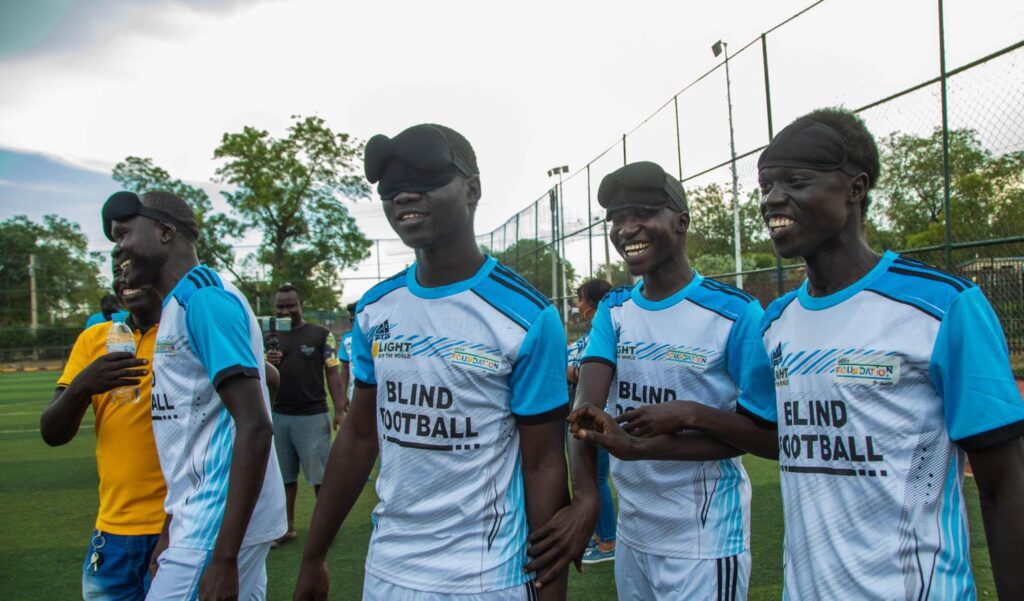The discipline is having a social impact in the world’s youngest country.
Bullen Chol
Like countless soccer fanatics, Jimmy Just Augustin likes imagining he’s the most celebrated player in the modern era. Yet there was a time when just enjoying a kickabout seemed farfetched.
“I was worried that I’d be useless at blind football (soccer), but I love it,” says Augustin, a South Sudanese man who lost his sight 11 years ago, his retinas beyond repair and his best on-field moments seemingly behind him. “I’m dribbling and scoring goals. My teammates call me (Lionel) Messi,” he adds, having found an unexpected route back into the sport.
His home, South Sudan, is the youngest nation worldwide, gaining independence from Sudan in 2011. The split occurred amid ongoing conflict, which has not since fully subsided. The North African country, with a youthful population, has refugees displaced by the war and a stagnating economy.
It also has a soccer profile, albeit a fledgling one at this early stage. Its senior men’s team sits 167th in FIFA’s global rankings, and its most successful club, Atlabara, from a neighborhood in the capital Juba, is yet to make a continental CAF Champions League appearance. From afar, its people idolize stars from elite leagues, often consuming them via radio. However, what stands out are the games for those who can’t see the ball.
With backing from Light for the World—a non-governmental organization focused on disability inclusion and eye health in Sub-Saharan Africa—South Sudan has been running its first Blind Premier League competition for just over a month. Light for the World, supported by UEFA’s Foundation for Children, has invested good money into disability sports projects in recent years—and this one helps open soccer avenues for everyone. Other partners include the Nando and Elsa Peretti Foundation and BMZ.
“We don’t see, so we use our ears to hear the jingling sounds of the ball (with a bell inside) and follow it,” says Augustin, who captains Kator Blind Football Club. “Everyone says ‘voy’ (Spanish for I’m coming) to ensure we don’t run into each other. Also, our coaches shout ‘my friend, shoot!’ and bang on the goalposts to alert us when the goal is near.”
The international discipline takes place on smaller fields than traditional 11-a-side games.
AFP via Getty Images
Of course, blind soccer—a five-a-side discipline believed to originate from Spain—is not indigenous to South Sudan. It has been a Paralympic sport since 2004 and, according to a report from the Los Angeles Times, has more than 60 internationally recognized teams, with Argentina, China and France among the leading lights. There are 195 nations today.
On the club front, not every major national league has an official blind competition running parallel. Blind or partially sighted people are a minority but come in the many thousands across most countries. Naturally, a significant proportion engages in soccer without featuring in recognized games.
“We started the sport in 2020 during the Covid-19 outbreak, and with only two players, having in mind that one day we’ll have a league,” says Simon Madol, the division’s technical director and a coach. “The Blind Football Premier League is a dream come true.
“We raise awareness using radio talk shows, posters and through our social media platforms like Twitter, Facebook and Instagram. We encourage people with and without visual impairments to join as players or guides.”
The blind soccer events are more than just places to gather, areas where the public can play and watch the game. They also help counter inequality. To provide some context, South Sudan only signed the United Nations disability rights convention earlier this year—welcome news for its disabled population, an estimated 1.2 million people.
Just over a decade old, South Sudan is aiming to develop its international sporting profile.
SOPA Images/LightRocket via Getty Images
“The main challenge people with disabilities face is the denial of their human rights due to lack of awareness towards disability inclusion,” notes Sophia Mohammed, Light for the World’s director in South Sudan.
“For example, accessing basic services like education, health, and employment are challenges. So, the main challenges are attitudinal, environmental, communication and institutional barriers.”
Blind soccer making an even bigger splash would involve boarding planes and leaving a legacy overseas, too. And while that seems a long shot for now, the camp believes anything is possible in the long run with growing interest and team spirit.
“We want to play abroad, internationally,” outlines Augustin. “Our ambition is to play at the Paralympics. Soccer unites people. I love my teammates, who are from all over South Sudan. They are not just friends and players. We’re one family and brothers.”
“In this game, it is not easy to score a goal because you cannot see the ball,” adds Clement Tereka Justin, another trailblazer who perhaps sums up the entire movement best.
“When you focus and keep the direction, you can find a way to score.”
Source link : https://www.forbes.com/sites/henryflynn/2023/07/28/why-south-sudan-has-become-a-focal-point-for-blind-soccer-players/
Author :
Publish date : 2023-07-28 07:00:00
Copyright for syndicated content belongs to the linked Source.
